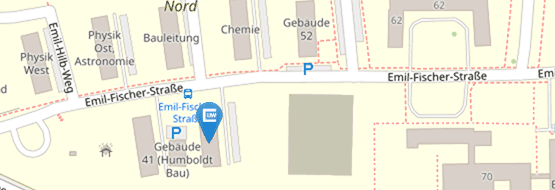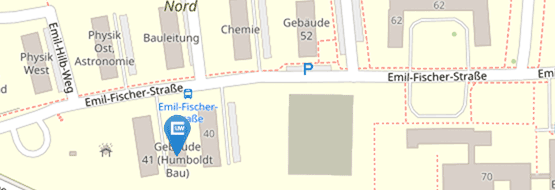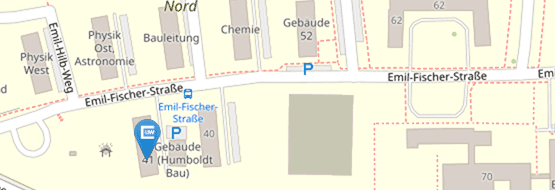Research Areas
The research of our team is focused on control theory and systems theory with an emphasis on the following topics:
Stability Theory
Stability of a dynamical system is a property which is crucial for many real-world applications.
We investigate whether or not these properties are preserved when the system is exposed to disturbances or when it is connected to other stable systems.
Interconnected Dynamical Systems
This area of research deals with the analysis of the dynamical behavior as well as the conception of large systems which originate from a coupling of many subsystems. One aspect is the investigation of the stability of large interconnected systems. In this context, we develop constructive methods to derive Lyapunov functions. Moreover, we study problems of decentralized control and state estimations. This field of research comprises an interesting interplay of methods from linear and nonlinear system theory and the theory of dynamical systems together with graph theory and the theory of positive systems, which are needed to describe the character of the coupling structure. In particular, methods from algebraic system theory and geometric system theory can be applied.
One particular project, supported by the DFG priority program 1305, is the investigation of state estimation, filtering, and control of systems that are connected through digital information channels. Such information channels are usually subject to hard limitations of the amount of transferable data, time-varying delays, and possible losses of data during the transmission. Classical methods of control theory assume that the amount of available data is unlimited at any time. One of the goals is to develop novel approaches that take constraints of communication into account.
In close connection to the problem of control under constraints of the communication capacity, there is the need to have an effective model for the dynamical behavior of information channels. They also have a typical input-output behavior, which can be optimized by a modification of protocols. An important aspect of our current research is variants of the so-called Transmission Control Protocol (TCP), which is one of the standard protocols for data transfer on the internet.
Another field of applications is the research on large logistic networks and the dynamical effects therein. In the near future, research on quantum networks will also be an interesting challenge.
Active researchers:
- Gunther Dirr
- Jens Jordan
- Michael Schönlein
- Fabian Wirth
Cooperation partners:
Bilinear Systems and Systems on Lie Groups
Nonlinear geometric control theory uses differential geometric methods to study and analyze time-discrete and time-continuous nonlinear control systems. Important tools are, for example, integrability of (involutive) distributions, the theorems by Frobenius and Hermann/Nagano, and many others.
Bilinear systems, or, more generally, invariant systems on Lie groups, form an important subclass of nonlinear systems. The particular structure of these systems allows an application of deep and fundamental results from Lie theory, which go beyond the usual statements of nonlinear theory. A rich and continuously growing field of applications is quantum control, i.e., control theory of quantum mechanical systems. This has led to many interesting mathematical problems, for example, problems concerning the Liouville-von-Neumann or the Lindblad-Kossakowski equations.
Involved persons of the research area:
Current project:
- see Quantum Control
Quantum Control
We do interdisciplinary research on quantum control, i.e., control of quantum mechanical systems, for example, finite-dimenisonal spin systems. Research on quantum control has lead to various technical innovations, such as new applications in nuclear magnetic resonance (NMR) spectroscopy and spin transport electronics (spintronics). Quantum control also provides theoretical foundations of quantum information theory and quantum computing. Among other topics, we are interested in algorithms for efficient computations of entanglement measures, C-numerical ranges, generalizations of the Solovay-Kitaev theorem, and general characterizations of reachability sets of quantum mechanical control systems.
In general, one distinguishes between so-called closed quantum systems (no interactions with the environment) and open quantum systems (interactions with the environment). While the time evolution of closed systems is described by one-parameter groups of unitary operators, the dynamics of open systems are determined by one-parameter semigroups of completely positive operators. In any case, the underlying quantum mechanical equations of motions (Liouville-von-Neumann and Lindblad-Kossakowski equations, respectively) lead to bilinear control systems.
Our current interests are focused on fundamental reachability and controllability sets of finite-dimensional open systems as well as infinite-dimensional closed systems. The theory of quantum ensembles is closely related to the investigations of the research group on ensemble controllability.
Involved persons of the research area and cooperation partners:
- Gunther Dirr
- Thomas Schulte-Herbrüggen, (TU München)
- Frederik vom Ende , (TU München)
- Michael Keyl , (Freie Universität Berlin)
Current project:
- Application for a DFG grant: Approximate Quantum Control in Infinite Dimensional Operator Spaces
Ensemble Controllability
The research of the team ensemble controllability is focused on the investigation of parameter-dependent systems and their controllability properties. It is slightly misleading, but nowadays well-established, to use the term ensemble for a parameter-dependent family of control systems. Our particular interest is devoted to the following scenarios:
1. Linear systems with continuous parameters. Since the case of finitely many parameters corresponds to a classical parallel connection, and since sufficient controllability conditions for finite-dimensional linear systems are well-known, we are interested in systems with continuous parameters. This leads to infintite-dimensional systems with the specific property that the inputs are finite-dimensional. We are also interested in necessary and sufficient conditions for controllability, which only have to be checked pointwise.
2. Bilinear systems with finitely many parameters: For bilinear systems, the case of finitely many parameters is only partially understood so far. It is certainly true that the problem of controllability and accessibility can be traced back to the well-known Lie Algebra Rank Condition (LARC). However, it is more desirable to have necessary and sufficient conditions, which can be easily checked pointwise, i.e., for each parameter value separately.
3. Bilinear systems with infinitely many parameters or a continuum of parameters: There all most no general results on such bilinear systems in the literature. Our approach is based on a formulation of the problem by means of Banach Lie groups and on techniques from the field of infinite-dimensional bilinear systems.
Active researchers:
- Gunther Dirr
- Michael Schönlein
Current projects:






